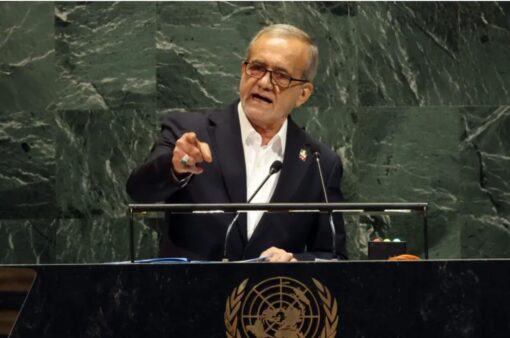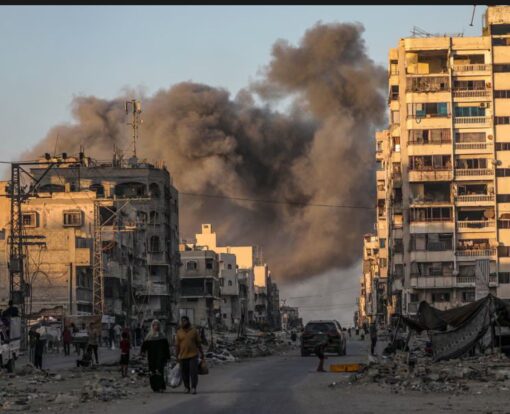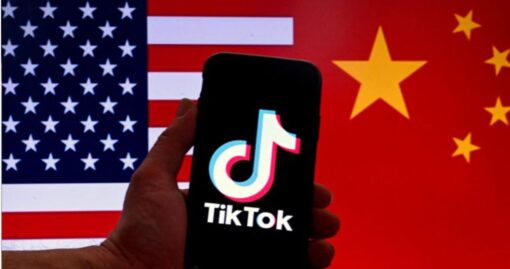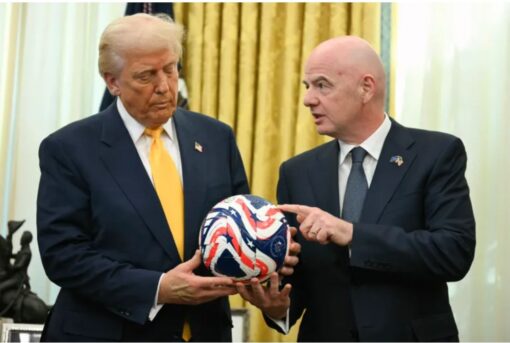Iranian President Masoud Pezeshkian delivered a high-profile address at the United Nations General Assembly in New York, declaring that Tehran will never build a nuclear bomb even as European powers move toward reimposing sanctions.
His statement came at a time of heightened tension in the Middle East, with Western governments accusing Iran of undermining nuclear commitments and with the September 27 deadline for sanctions “snapback” fast approaching.
Pezeshkian told world leaders that his country’s nuclear programme remains entirely peaceful and that attempts to portray Iran as seeking weapons of mass destruction were politically motivated.
He accused the United Kingdom, France, and Germany of acting under pressure from the United States, claiming that their latest efforts to restore punitive measures damaged international trust. “We shall never seek a nuclear weapon,” he said, while accusing critics of applying double standards.
The backdrop to his speech is the looming decision by the three European states, known as the E3, to reinstate sweeping UN sanctions against Tehran.
They argue that Iran has failed to comply with the terms of the 2015 Joint Comprehensive Plan of Action, the nuclear deal designed to limit Iran’s uranium enrichment in exchange for economic relief.
That agreement unraveled after former US President Donald Trump withdrew Washington’s participation in 2018 and reinstated sanctions, prompting Tehran to scale back its commitments, enrich uranium beyond agreed levels, and restrict access for inspectors from the International Atomic Energy Agency.

The E3 have set a final deadline, warning that unless Iran restores access and engages in renewed dialogue, international restrictions suspended under the deal will be brought back in full force.
Pezeshkian used his UN platform to frame Iran’s defiance in the context of the devastating 12-day war earlier this year, triggered by surprise Israeli and US attacks on Iranian targets.
Those strikes killed more than 1,000 civilians and eliminated several top military commanders while damaging Iran’s defense infrastructure. The president accused Israel of attempting to dominate the region under what he described as a “ludicrous scheme of greater Israel” and claimed the attacks revealed a reliance on naked force rather than diplomacy.
He said Iran would not surrender to aggression and linked his country’s suffering to the plight of Palestinians under Israeli bombardment.
His comments echoed the position of Supreme Leader Ayatollah Ali Khamenei, who one day earlier had reiterated that Iran does not intend to develop nuclear weapons but ruled out direct negotiations with the United States.
Khamenei described Western proposals as “an imposition, not a negotiation,” hardening Tehran’s stance against pressure from Washington and its allies. Inside Iran’s parliament, however, dozens of lawmakers have demanded a reconsideration of the country’s defensive doctrine, urging a move toward nuclear deterrence should sanctions be reimposed.
Pezeshkian sought to distance himself from those calls, insisting that Iran remains committed to lawful, peaceful nuclear development while portraying the government as a responsible actor willing to cooperate with “peace-seeking nations.”
The scars of the June conflict remain fresh. Israel’s large-scale Operation Rising Lion was the most extensive assault on Iranian forces in recent years. It crippled elements of Iran’s command-and-control network and eliminated several senior figures in the Revolutionary Guard.
In response, Tehran launched ballistic missiles toward Israeli cities and military bases, heightening fears of a broader regional war.
Although the fighting eventually subsided, the exchange revealed Iran’s vulnerabilities both militarily and diplomatically. Pezeshkian’s UN speech was an effort to project strength in defiance of foreign pressure while also signaling a desire for dialogue with the wider international community.
Global reactions to his remarks were mixed. Supporters of renewed diplomacy described his clear statement against nuclear weapons as an opportunity for dialogue, while critics dismissed the pledge as rhetoric unsupported by evidence.
European diplomats insisted that only full cooperation with inspectors would restore confidence. Israeli officials immediately rejected the assurances, claiming Tehran’s nuclear activities remain geared toward weapons development, despite consistent Iranian denials.
Much of the UN debate was dominated by the Gaza war, with multiple leaders condemning Israel’s bombardment and the humanitarian catastrophe that has followed.
Pezeshkian tied Iran’s position directly to that issue, portraying his country’s struggle against sanctions and military attacks as part of the same injustice faced by Palestinians.
He accused Israel of pursuing expansionist goals through genocide, starvation, and apartheid, an accusation that resonated with several states but drew sharp criticism from Israel and its allies.

Despite harsh words for Western governments, Pezeshkian ended on a softer note, offering Iran as a “trustworthy companion” for nations that value peace and dignity.
He called for global cooperation on human rights, security, and development, saying, “Let us turn threats into opportunities.” The invitation appeared aimed at non-Western partners in Asia, Africa, and Latin America, regions where Tehran has strengthened ties in order to reduce reliance on Western trade and financial systems.
As the deadline for sanctions nears, the divide between Tehran and the West remains wide. Iran continues to insist that its nuclear programme is peaceful and blames Washington for violating commitments by withdrawing from the 2015 accord.
Western powers argue that Tehran’s uranium enrichment and its lack of cooperation with inspectors are clear breaches. Analysts warn that if sanctions are reimposed, Iran may double down on hardline policies, including a possible reconsideration of its nuclear restraint. With Israel and the United States maintaining the option of further strikes, the risk of escalation is significant.
Pezeshkian’s vow never to seek nuclear weapons was the centerpiece of his address, but whether that assurance leads to new talks or to a deeper standoff remains uncertain.
The stakes extend beyond Iran’s borders, as the confrontation has the potential to reshape security in the Middle East and unsettle global markets. For now, the world is left to weigh the credibility of Iran’s pledge against the reality of its nuclear advances and the political pressures driving the standoff.


